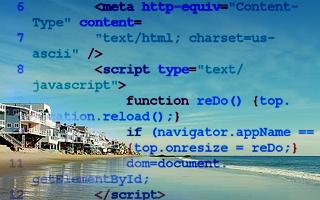L.A. isn’t just a mecca for film and video game studios. In the past three years, the Los Angeles tech scene has evolved from a small cadre of social media-happy party animals to a legitimate and sustainable tech community to rival Silicon Valley.
“Los Angeles is a town that spins a million stories every day,” says local technophile Sean Percival. “It’s the perfect backdrop for a techie looking to tell his or her own story.”
Percival is at once a gossip and a godfather in the community. A MySpace exec, he and his wife, Laurie, also became loved and feared in earlier days for their hilarious interpretations of L.A. tech life on Lalawag, a colorful blog about the local scene. Percival now characterizes the current SoCal vibe as “a lot more company-building and a lot fewer poolside mixers.”
![]()
Back in 2008, the L.A. tech scene was in its party-filled, boozy heyday. Every night of the week, Twitter advocates and wannapreneurs could be found gathering at an array of networking events. The town was crawling with social media enthusiasts, but the scene wasn’t yet the kind of primordial soup that leads to healthy young startups.
“After some big hits like Overture during the first dot-com boom,” says Percival, “the space had been somewhat dormant. At this point, we were mostly using new technologies like Twitter to help build the community and find one another. Lots of ideas were being tossed around and connections made, but not much building.”
Even so, tech in L.A. circa 2007 and 2008 was more than just empty enthusiasm. The area had MySpace going for it (and back then, it was still a strong contender among social networks). Huge entertainment companies were beginning to look toward the web more, and they were tapping local digital experts for help. A handful of thought leaders were also working on projects like Twiistup, a homebrewed startup competition.
But what’s going on in Los Angeles today is a far cry from what was happening there four or five years ago. The parties have died down, and angel investors and smart business minds are getting to work.
The city’s tech scene is a few years more mature, more realistic, more productive — and it’s making headlines for its entrepreneurial atmosphere. Meet the new face of L.A. tech.
Why Entrepreneurs Love L.A.
 Paige Craig, L.A. entrepreneur & investor
Paige Craig, L.A. entrepreneur & investor
One of the most prominent figures in — and advocates for — the new school of L.A.-based entrepreneurship is Paige Craig. A former Marine from the East Coast with a background in defense contracting, Craig now runs startup BetterWorks and typifies the “Silicon Beach” CEO: In the de rigeur uniform of hoodies, shorts, and flip-flops, he brims with sun-drenched charisma.
“We’re a diverse lot,” he says of L.A.’s tech scene, “but more than San Francisco/Silicon Valley startups, we have a very healthy work-hard-play-hard balance.”
Joey Flores is the dreadlocked co-founder of Earbits, a Y Combinator startup that’s making its mark on the music industry. “I love L.A. as an entrepreneur,” he tells us, “because I think it’s incredibly important to create work-life balance, and you can’t beat Los Angeles for that.
“My partners and I work extremely hard, but every other day [Earbits EVP] Yotam [Rosenbaum] and I discuss work as we walk to the beach and get some sun on the boardwalk,” Flores says. “When I’ve had a rough day, I can hit Main Street and go to one of a dozen bars, where I often run into other entrepreneurs I know. If I want to go see world-class music or stand-up comedy, I can do it on any night of the week.”
Beyond the colorful nightlife and perfect weather, Craig defines what is, for him, the crux of Los Angeles’ entrepreneurial community: a connection to average consumers’ needs and the all-important hustle.
“There’s a very ‘real’ culture here,” Craig says. “Most of us are building businesses that solve real problems and drive real revenues. We don’t have the luxury of a tech bubble down here, so we all have to figure our business models out quickly, deliver value and make the bucks.
“We’re a city of hustlers… We know how to sell, and we can put sizzle on the burger.”
Grubwithus co-founder Eddy Lu, who spent time in the Bay Area as a UC Berkeley student, echoes these sentiments, saying, “We chose to be located where our customers are (and where the sun is!). Also, we’re going to be an operations heavy company, so why compete with Facebook, Google, Zynga, Twitter, etc. for ops talent when we can have L.A. all to ourselves?”
Craig says that since he moved to Los Angeles in the fall of 2008, he’s seen a tenfold increase in the number of startups in the area. He also noted “the emergence of early and successful founders investing in and advising the new crop of companies.”
A Culture of Coopetition
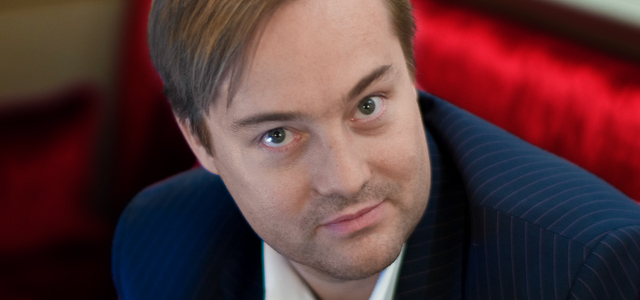 L.A. pundit & CEO Jason Calacanis
L.A. pundit & CEO Jason Calacanis
One of those “early and successful” types is Jason Calacanis, a serial entrepreneur and investor, an old-timer who suffered through the dot-com bust and survived to build Mahalo, his Santa Monica-based startup. He tells us, “If I was in the Valley, I would be up against Twitter, Google, LinkedIn and Facebook. I think I’d lose most of those battles.”
But in L.A., he says, “I love the lack of competition for talent… I never lose a talent race.”
Craig seconds this emotion: “Once you build your team, you don’t have to worry about poaching. You have a longer runway to get the team together and produce value without the next tech giant or hot startup stealing your awesome startup babies away from you.”
Summing up the cooperation-not-competition ethic so common to smaller startup markets, Craig adds, “Being a tight-knit band of entrepreneurs, we constantly help each other and new startups with funding, sales, strategy, recruiting and more. It’s a close band of brothers and sisters here, and we all take the time to help the Silicon Beach tribe grow strong.”
Flores, like many of his Angeleno peers, can rattle off a long list of surprisingly hot L.A.-based startups with the same celerity others might display when naming their favorite bands. Craig’s BetterWorks and MobileRoadie (which he has advised) generally make the list, as does Zaarly, which launched at Startup Weekend L.A. with a tweet from Demi Moore and an investment from Ashton Kutcher.
“L.A. is churning out some killer companies,” he says, “and it’s getting better by the day. There are great events to go to that do a better job of mixing business and pleasure than you’ll get in the Valley.”
Show Them the Money
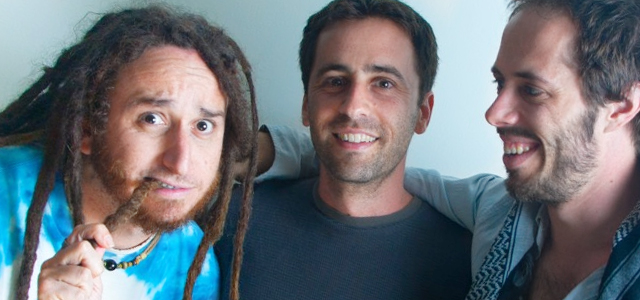 The Earbits co-founders
The Earbits co-founders
Common wisdom says if you want big money — big, multi-million dollar VC deals in particular — you have to head north to Silicon Valley. Yet some, both within and outside in the L.A. scene, are saying more Bay Area VCs are looking south for their next big deal.
“In the last three years,” says Craig, “I’ve seen almost every one of those folks coming down and investing in LA companies. VCs and angels love coming to LA, and the smart ones find killer companies to invest in.”
And for those who prefer to take small amounts of angel funding to get off the ground, as many L.A. startups have, the community is practically glittering with angel investors, “hundreds” according to Craig’s estimation. The city is one of the top three locations on AngelList, a close-knit, high-impact community of investors and startups.
While L.A. investments have followed nationwide trends since the recession, there are a few bright spots, mostly around the web sector. “SoCal investments haven’t been as large as they used to be about 3-plus years ago,” says a representative of Dow Jones VentureSource, which compiles data on venture capital investments. “Looking at the first half of 2009, 2010 and 2011, deal counts have risen slightly each year. Capital invested has seen some ups and downs, but a few big investments one year can easily inflate this number.”
In fact, looking at the number of deals inked in SoCal alone, those digits have already risen beyond pre-recession levels for the consumer information services sector, which includes social media web apps and online entertainment properties, as seen in the graph below.
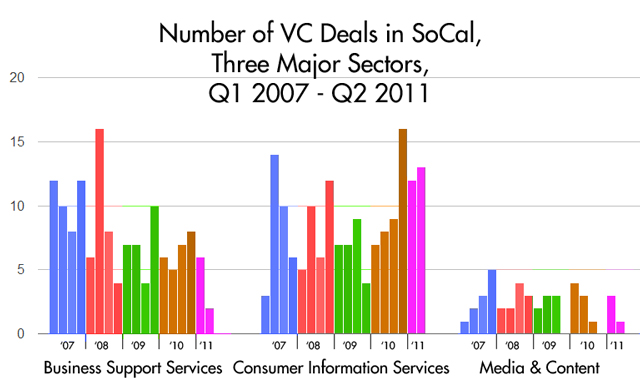
The spokesperson also notes that whereas national VC activity is seeing its strongest growth in the IT and healthcare sectors, Los Angeles’ biggest areas of growth have been consumer-facing web apps, media companies, and web-based marketing tools.
“Southern California’s consumer web and media companies are heavily concentrated in L.A., which make sense, given the primary industry that area it’s known for. L.A.-based companies also make up a large proportion of the business support services companies getting funding. This sector is largely driven by investments in online advertising and marketing companies.”
L.A.’s Downside
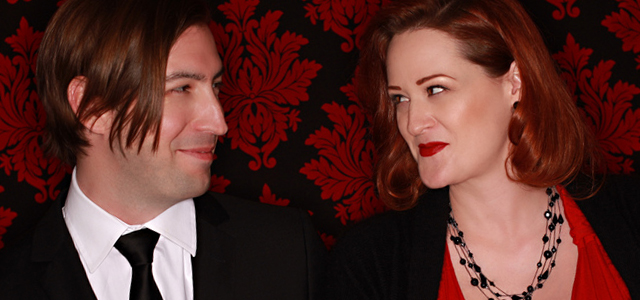 Sean and Laurie Percival, documentarians of the L.A. scene
Sean and Laurie Percival, documentarians of the L.A. scene
The L.A. scene’s small and close-knit community is a blessing, but local entrepreneurs know it needs to grow. Craig says, “We know we need to attract more startups and we work hard to welcome and help every startup that takes the jump into Silicon Beach.”
But one glaring (and baffling) problem is the relative lack of engineering and development talent. That’s the downside of the lack of competition for talent cited by Calacanis: If the pool of tech companies is relatively small, so is the pool of qualified candidates.
“Engineers have flocked to San Francisco/Silicon Valley historically,” says Craig, “and there is a density of engineering talent up there. But the flip side is that these folks get recruited in a second.”
Daniel Dato co-founded local startup accelerator Upstart.LA. He says, “The challenge here is that, as traditional companies become more technology-oriented, startups are competing against some very mainstream alternatives for technical talent. [Tech companies competing with non-tech ones] wasn’t exactly the case in Silicon Valley or Boulder, but it’s common in larger metro areas like L.A. and New York.”
Still, Dato points out that the wealth of L.A.-area universities is fertile ground for new hires and he remains enthusiastic about LA’s potential. Citing the newest crop of startup-focused attorneys, coworking spaces and investors, he says, “The most significant drawback of the LA market was the relative youth of the startup culture, which meant that it took a little more effort to get your startup going. But that’s changing very quickly.”
Micki Krimmel founded NeighboorGoods, a startup that lets users loan and borrow rather than sell and buy their excess items. She says, “I have to admit, it would be a lot easier to build a startup in San Francisco… It’s where the talent is. It’s where the money is. It’s where the community is.” As a result, Krimmel says she finds herself making frequent trips to the Bay Area out of necessity alone.
Why L.A. Doesn’t Care About San Francisco
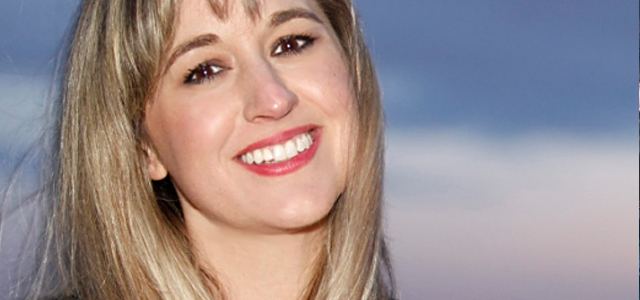 Bakespace CEO Babette Pepaj
Bakespace CEO Babette Pepaj
Dato, like many of his SoCal counterparts, is less concerned about participating in an ego-driven feud with the Bay Area and more interested in simply making L.A. the best market it can be.
“We can learn from the things that made Silicon Valley a success, but we also have many inherent advantages that can make SoCal a leader in its own right,” Dato says.
If a startup is directed at solving the problems of the creative community, the L.A. area makes perfect sense.
“Our company is playing in the content world, specifically music,” Flores says, “and L.A. is pretty much the best place on the planet for being near our clients.”
He’s not alone in making that choice for that reason. Music-related startups in Los Angeles abound, as do startups focusing on the problems and growing pains of the film and television industries.
“With a rich history in entertainment, you usually see some hints of L.A.’s roots within any local startup,” Percival notes. “We try to keep the usual Hollywood bullshit out of the picture, of course, and succeed for the most part.”
But natives are quick to point out that the L.A. startup scene isn’t just for entertainment anymore. Speaking to Craig’s point about solving real-world problems outside a tech-obsessed subculture, Krimmel says, “My favorite thing about L.A. has always been that it’s not San Francisco. The homogeneity in the tech community in the Valley can be detrimental to building something that appeals to a wider audience.”
Babette Pepaj founded her startup, Bakespace, in Los Angeles. The site itself is a social network of sorts for home cooks and bakers.
This kind of startup could have been built anywhere, but as Pepaj says, “I love building a company in L.A. because it’s a place where you’re defined as much by your ideas and potential as by your past. You don’t need to have already sold a company or had an IPO to be taken seriously; customers and revenue trump a Silicon Valley pedigree.
“When it comes to tech, L.A. is the wild west, and I wouldn’t want to be anywhere else.”
Top image based on a photo from tensaibuta. Image of Paige Craig courtesy of Brian Solis. Image of Jason Calacanis courtesy of Joi Ito. Image of Earbits team courtesy of AmpedUpMag.com. Image of the Percivals courtesy of Lan Bui. Image of Babette Pepaj courtesy of Cathy Brooks. Banner background image via Andy Z./Shutterstock.

VentureBeat's mission is to be a digital town square for technical decision-makers to gain knowledge about transformative enterprise technology and transact. Learn More
